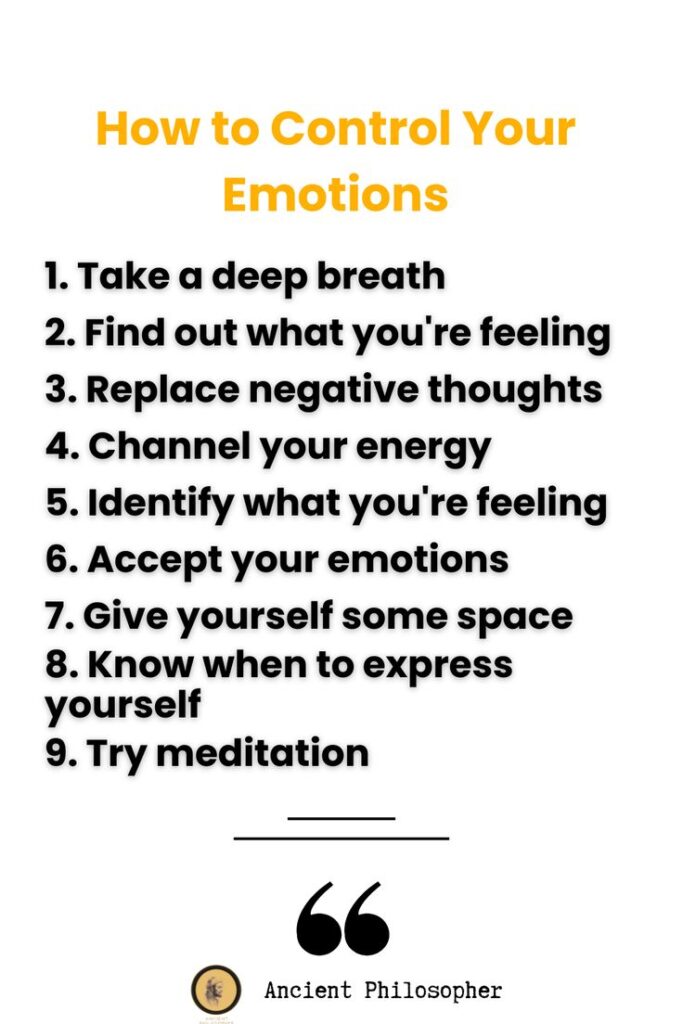In the labyrinth of human experience, emotions reign supreme as both our guiding compass and our greatest challenge. From moments of profound joy to bouts of overwhelming despair, our emotional landscape shapes the very fabric of our existence. Yet, amidst the whirlwind of feelings that sweep us off our feet, lies a profound truth: the power to control our emotions is within our grasp.
In this article, we embark on a journey of self-discovery and empowerment, exploring nine essential strategies for mastering emotional regulation. Through mindfulness, self-awareness, and compassionate self-care, we uncover the keys to navigating the turbulent seas of emotion with grace and resilience.
Join us as we delve into the heart of emotional mastery and embark on a transformative quest toward greater well-being and fulfillment.
#01. Take a Deep Breath
In moments of emotional intensity, deep breathing serves as a foundational practice to regain control. Deep breaths help activate the body’s relaxation response, calming the nervous system and providing a sense of stability amidst turbulent emotions. By focusing on the rhythm of your breath, you can create a momentary pause, allowing space for clearer thinking and more deliberate responses.
#02. Find Out What You’re Feeling
Emotions often manifest as complex and nuanced experiences, and it’s crucial to delve beneath the surface to understand their origins and implications. Take the time to introspect and identify the specific emotions you’re experiencing. This process of emotional self-awareness enables you to address underlying triggers, facilitating more effective emotional regulation strategies tailored to your needs.
#03. Replace Your Negative Thoughts
Negative thinking patterns can exacerbate emotional distress, perpetuating a cycle of rumination and heightened negativity. Combat these tendencies by actively challenging and reframing negative thoughts. Cultivate a mindset focused on resilience and growth, seeking out silver linings or alternative perspectives in challenging situations. By consciously redirecting your cognitive processes, you can gradually shift towards a more optimistic and adaptive outlook.
#04. Channel Your Energy
Emotions are powerful sources of energy, and learning to channel this energy constructively can promote emotional balance and well-being. Explore activities that resonate with you on a personal level, whether it’s engaging in physical exercise, creative pursuits, or community involvement. By channeling your emotional energy into meaningful endeavors, you not only diffuse tension but also cultivate a sense of purpose and fulfillment.
#05. Identify What You’re Feeling
Emotions encompass a diverse spectrum of feelings, each carrying its own distinct flavor and significance. Take the time to differentiate between various emotional states, refining your emotional vocabulary and honing your ability to discern subtle nuances. By accurately identifying and labeling your emotions, you empower yourself to respond with greater precision and insight, paving the way for more nuanced emotional regulation strategies.
#06. Accept Your Emotions
Embracing your emotions with radical acceptance forms the cornerstone of effective emotional regulation. Rather than suppressing or denying your feelings, cultivate an attitude of compassionate self-acceptance. Acknowledge the validity of your emotional experiences, recognizing them as natural and inherently human. By embracing your emotions without judgment or resistance, you create an environment conducive to genuine self-exploration and growth.
#07. Give Yourself Some Space
When emotions run high, creating space for reflection and introspection becomes essential. Grant yourself permission to step away from triggering situations or overwhelming stimuli, allowing yourself the opportunity to decompress and regain equilibrium. Engage in activities that promote relaxation and self-care, whether it’s taking a leisurely walk, practicing mindfulness meditation, or immersing yourself in a favorite hobby. By prioritizing your emotional well-being and establishing boundaries when necessary, you foster a sense of inner calm and resilience.
#08. Know When to Express Yourself
Effective communication serves as a vital tool for navigating and regulating emotions within interpersonal relationships. Learn to discern appropriate outlets for expressing your feelings, striking a balance between assertiveness and empathy. Communicate your emotions openly and honestly, expressing yourself with clarity and sincerity while remaining attuned to the perspectives and feelings of others. By cultivating healthy channels of emotional expression, you foster deeper connections and promote mutual understanding within your social sphere.
#09. Try Medication (if necessary)
In cases where intense emotions or underlying mental health conditions pose significant challenges to emotional regulation, medication may offer a supplementary form of support. Consultation with a qualified healthcare professional is paramount, as they can provide comprehensive assessment and personalized recommendations tailored to your unique needs.
If deemed appropriate, medication can help alleviate symptoms of anxiety, depression, or other mood disorders, enhancing your capacity for emotional self-regulation and overall well-being. It’s essential to approach medication as one component of a holistic treatment plan, complementing other therapeutic modalities and lifestyle interventions to promote comprehensive emotional wellness.


